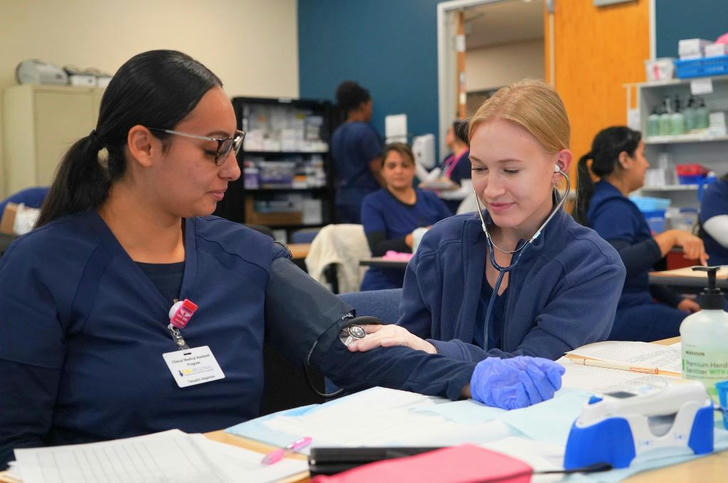How To Become A Patient Care Technician After Graduating From High School?
Even with a high school diploma, you can get a job in a hospital. View 26 job postingsOne of them is patient care technician. This blog post will break down what a PCT is, the duties of a PCT, the work environment, salary, and education requirements. By the end, you will have a better understanding of what a PCT is and whether this is a viable career for you.

| What Is A Patient Care Technician? |
A Patient Care Technician (PCT) provides direct care and support to patients under the supervision of a registered nurse or other healthcare provider. It is an excellent way to enter the medical profession. PCTs are trained to provide basic care in settings such as hospitals, nursing homes, clinics, and rehabilitation centers.
| What Does A Patient Care Technician Do? |
PCTs work alongside treatment teams in hospitals, extended care facilities, and rehabilitation centers, combining clinical tasks with personal care duties to ensure patients are safe, comfortable, and well-supported. Their primary duties include disinfecting and cleaning patient rooms, monitoring patients’ health and vital signs, and helping patients with basic needs such as feeding and grooming. Other duties include:
• Regularly checking patients’ blood pressure, heartbeat, and pulse
• Providing care by listening to patients’ concerns and answering any questions they have
• Monitoring patient conditions and providing updates to the medical team
• Turn, reposition, and move patients between beds, wheelchairs, and seats
• Monitoring patients’ food and fluid intake
• Accompanying patients for X-rays and other imaging tests
| Where Do Patient Care Technicians Work? |
Hospitals: Hospitals are the most common place PCTs work, assisting with patient care in the emergency room, surgical ward, ICU, or other departments.
Nursing Homes and Long-Term Care Facilities: In nursing homes, you’ll develop closer relationships with residents while assisting with daily care and monitoring their health over time.
Outpatient Clinics: Prefer a set Monday-Friday schedule? Outpatient clinics can help you with patient preparation, minor procedures, and follow-up visits without the hassles of a hospital’s irregular hours.
Rehabilitation Centers: If you’re passionate about supporting the recovery journey, rehabilitation centers can allow you to work with patients undergoing physical therapy, occupational therapy, or post-operative rehabilitation.
Home Healthcare Services: PCTs also work one-on-one with patients in their homes, providing tailored care to support their independence while ensuring their needs are met.
| How Much Do Patient Care Technicians Make? |
The average annual salary for a patient care technician in the United States is about $45,000, depending on factors such as location, certification, and years of experience.
According to Glassdoor, here’s a rough breakdown:
Entry-level PCT (0-1 years): about $39,000-54,000 per year
Mid-level PCT (1-3 years): about $41,000-56,000 per year
Experienced PCT (5+ years): Salaries can go up to $70,000+ per year
Find more information about salaries on Indeed
It’s worth noting that PCTs often enjoy other benefits, such as health insurance, retirement benefits, and career advancement opportunities. Additionally, if you work in an area with high demand or a specialized healthcare setting, the salary may be higher.
| How To Become A Patient Care Technician? |
Step 1: Get a High School Diploma or GED/High School Equivalency
If you don't have the high school diploma or GED required for training, CALRegional can help you get these diplomas online for free! Just call for assistance.
Step 2: Enroll in the PCT Certification Program
At CALRegional, the PCT program takes only 8-10 weeks to complete and includes a guaranteed 80 hours of externship so you can get real-world experience before applying for jobs. Programs include both classroom learning and hands-on clinical training.
Step 3: Get Certified
After completing the program, students will need to take the CPCT/A (Certified Patient Care Technician/Assistant) exam through the National Healthcare Association to become a nationally certified CPT. While certification may not be mandatory everywhere, it can greatly increase employment opportunities and earning potential.
Step 4: Apply for Positions
Once you're certified, polish your resume, highlight your clinical skills, and begin applying to hospitals, nursing homes, or other preferred work environments.
| What's Next After Patient Care Technician? |
Becoming a PCT is a great start to a rewarding healthcare career. Many PCTs stay in the position long term, gaining experience and increasing their income over time. But if you want to advance in your healthcare career, there are multiple opportunities for you to choose from! Here are 6 popular career paths for PCTs:
Licensed Practical Nurse (LPN): Take your nursing skills to the next level when you become an LPN. With additional certifications, you'll have more responsibilities and higher earning potential.
Registered Nurse (RN): Want to be a leader in patient care? Transition into an RN role and be responsible for key medical procedures, collaboration with physicians, and more.
Dialysis Technician: Specializes in renal care, assisting patients undergoing dialysis treatments—a healthcare profession that's growing in demand.
Phlebotomy Technician: If precision is your strength, consider specializing in phlebotomy technology, which focuses on drawing and managing blood samples.
Medical Assistant: Move into a dynamic role that combines administrative and clinical responsibilities in a healthcare setting.
Home Healthcare Specialists: Want a more personalized service? Provide care to patients directly in their homes and dramatically improve their daily lives.
| Conclusion: A Rewarding Career As A Pct Is Waiting For You! |
If you are compassionate, enjoy providing emotional support to others, and want to work in the clinical side of healthcare, this may be the career for you. PCTs are in increasing demand, ensuring ample opportunities for advancement. Best of all, becoming a PCT allows you to enter the workforce and make an impact faster than many other healthcare roles. Take the first step toward a rewarding career now! Details of CALRegional's PCT Program
